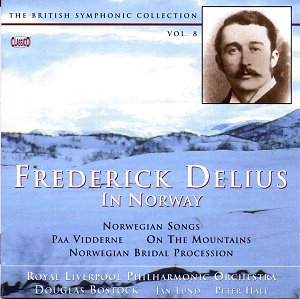The unlikely alliance
between a Danish company, a English
conductor, the leading light in the
promotion of music of the British renaissance
and the Liverpool orchestra has produced
a series of valuable discs presenting
little known or completely unknown British
music. This is the eighth volume in
the series. There have been others since
and more are to come.
The symphonic poem
'after Ibsen' On the Mountains
was sketched while the composer
was on a walking holiday with Grieg
and Sinding in the Jotunheim Mountains
in 1889. It was premiered in Oslo in
1891. Torridly romantic it makes opulent
use of a Tchaikovskian idea which may
well remind you of a moment in the Fourth
Symphony. The material is not perhaps
as memorable as it might have been but
it works well. The Mountains were to
be a recurrent motif in Delius's music. They
reappear in the Song of the High
Hills.
The Seven Songs
are well enough known from the
Unicorn Fenby Edition recording made
all of thirty years ago if not longer.
Sarah Walker and Ian Partridge make
a good job of them in that case. Jan
Lund is more splendidly recorded with
detail after detail in pleasing focus
under Tony Wass's watchful controls.
Lund however seems to be afflicted with
a tremble in the voice which some will
find distracting. Six of the seven songs
had previously been set by Grieg so
Delius must have had considerable confidence
in their worth and his abilities. Only
two (Twilight Fancies and The
Birds' Story) were orchestrated
by Delius. Beecham did the honours for
Young Venevil and Cradle Song.
Anthony Payne's specially commissioned
orchestrations of Hidden Love and
The Minstrel complete the picture
and are perfectly in style - compare
the grinding gear changes you find in
the orchestration of Finzi songs on
the Chandos CD that also includes the
violin concerto. With the exception
of The Homeward Way (by Vinje)
these are settings of Bjørnson
and Ibsen.
In 1889 Delius orchestrated
Grieg's cheery Bridal Procession
(Op.19 No. 2) - a strongly folk-nationalist
piece. His work has great delicacy with
much soloistic writing in the manner
of Smetana but with a light hand completely
in keeping with Delius's flighty innocence.
Paa Vidderne
is an epic score not far short
of three quarters of an hour in performance.
The poem, running to 68 stanzas, is
by Henrik Ibsen here in a translation
by Lionel Carley. The work is an example
of melodrama - i.e. music with spoken
voice. The genre was popular in the
decades running up to the start of the
twentieth century. In England the format
continued into the 1920s and beyond.
When you hear this you may think of
Bliss's Morning Heroes and Vaughan
Williams' An Oxford Elegy. Of
these two works it is the Matthew Arnold
'Elegy' with its seeking in vain for
Thyrsis the Scholar Gypsy that is most
closely resembled. Peter Hall has the
noble vocal bearing of John Westbrook
(regular orator for EMI for the Bliss
and RVW works) and his accent is less
'received BBC' than Westbrook's. His
delivery, always deeply sensitive, is
never obliterated by the orchestra.
Ultimately after tests and visions in
the setting of the narrator's beloved
high places he gives up all ‘valley
loves’ and allegiances in exchange for
a lifetime's communion with mountain,
crag and high pasture. The mountain
theme was to find complete consummation
in 1911 in The Song of the High Hills
however Paa Vidderne is satisfying
in its own right and is the most finished,
rounded and successful work of the four
collected here.
The music of Paa
Vidderne is Tchaikovskian in its
echoing of the passion of the lead character
for his love (tr. 1-2). Shreds of themes
later to mature as Walk to the Paradise
Garden can be heard (00.15 tr.15)
also the horn calls of Hassan's
dawn and Song of the High Hills (2.03
in tr.15). The loss of self in the mountains
can also be heard in the music of Vitezlav
Novak and Mieczyslaw Karlowicz. These
composers too were able to find their
own equivalent of Wordsworth's 'visionary
gleam' in the oxygen-light altitudes
and wildernesses. In Delius and Ibsen's
perfectly shared vision we know exactly
where the gleam has fled and that the
narrator has become the Thyrsis of the
heights. There may be little call for
such works in the concert hall but they
make ideal CD listening.
This disc was recorded
with financial assistance from the Delius
Trust.
The notes by Lewis
Foreman are encyclopaedic and deserve
to join the bibliography of Delius scholarship.
I have idiosyncratic
reservations about the tenor but that
apart this is a strong, generous, valuable
and substantial collection of early
Delius. The grouping has its own compelling
logic and both Delians as well as those
concerned with impressionistic late-romanticism
will have to add this disc to their
shelves.
Rob Barnett
see also review
by Stephen Lloyd
